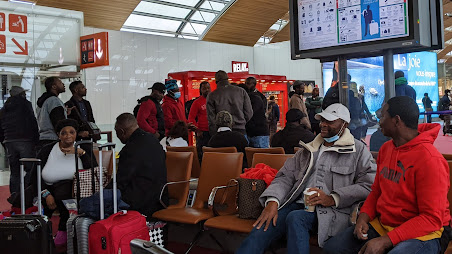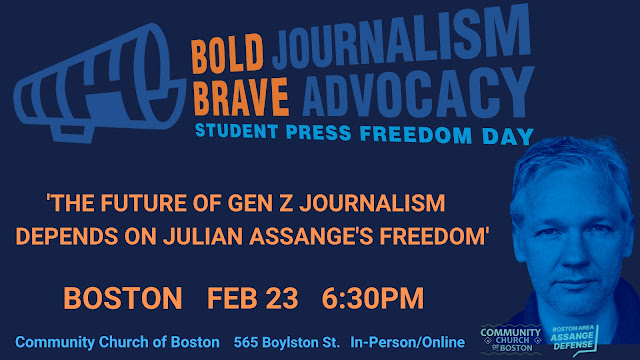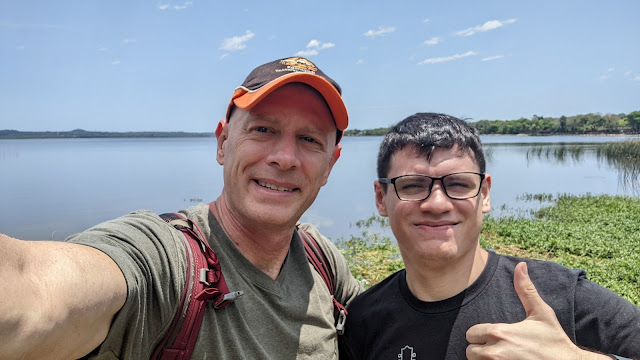 |
Boarding a flight in Ilorin, Nigeria, in December 2022.
RJ Peltz-Steele CC BY-NC-SA 4.0
|
A Savory Tort Investigation The Christmastime Southwest meltdown has prompted tongue wagging in Congress over a "Passenger Bill of Rights" to redress the radical imbalance of market power that has left Americans at the mercy of an oligopolist airline industry for decades.
Don't get your hopes up. In the United States, airlines have been playing cat and mouse with regulators since the mail took to the air in the 1920s. And the cat has never been enthusiastic about the chase.
Passenger protection from exploitative practices in the airline industry has been a congressional dog whistle since overbooking became a business model in the 1960s. Ralph Nader took on the issue, along with so many others, in the 1970s. We've swung back and forth between transparent pricing and the piling on of surprise fees enough times to make you use your sick bag. Over the years, more passenger bills of rights have died in Congress than we have airlines. Well, that's a low bar, but you take my point.
As in all things when corporatocracy clashes with simple equity in the marketplace, the European Union is doing a better job than the United States to level the playing field. The crown jewel of more robust European consumer protection is Regulation 261/2004, which has been on the job for almost twenty years. When flights are delayed or canceled, EU 261 requires compensation to customers in cold, hard cash.
The circumstances that lead to an EU 261 payout are well circumscribed. But when it happens, an airline feels the pinch. The regulation pertains upon delay or cancellation, EU guidance explains (bold in original), when:
- the flight is within the EU and is operated either by an EU or a non-EU airline;
- the flight arrives in the EU from outside the EU and is operated by an EU airline; or
- the flight departs from the EU to a non-EU country operated by an EU or a non-EU airline.
Here is the compensation schedule, per passenger:
- Type 1: €250 for a delay of two-plus hours, or €125 if re-routed to arrive fewer than four hours late, for flights of 1,500 kilometers or less.
- Type 2: €400 for a
delay of three-plus hours, or €200 if re-routed to arrive fewer than four hours late, for intra-EU flights of more than 1,500
kilometers and for all other flights between 1,500 and 3,000 kilometers.
- Type 3: €600 for a delay of four-plus hours, or €300 if re-routed to arrive fewer than four hours late, for all other flights.
There need be no compensation when the delay can be attributed to a cause extrinsic to the carrier, such as weather. A passenger's receipt of compensation, including non-monetary
assistance, pursuant to the law of a non-EU country precludes an EU claim.
Cash compensation is a welcome recognition that airline passengers suffer real costs when flights are delayed or cancelled—more than what is covered by a meal voucher or even, when necessary, an overnight stay. Ours is now a world of nonrefundable reservations for hotels, cars, and tours. Travel insurance is becoming a must, and yet another expense. Vacation time meanwhile is increasingly scarce, especially for Americans.
Meaningful compensation incentivizes airlines to work smarter. For example, scheduling departures too tightly, failing to anticipate mechanical needs, or simply de-prioritizing the correction of problems all become decisions with bottom-line consequences.
The outer jurisdictional limits of EU 261 are not spelled out on the face of the regulation, but European regulators and courts largely have construed silence expansively. EU 261 claims are not limited to EU citizens and airlines, as long as an EU country can exercise jurisdiction. EU 261 has an exception for "extraordinary circumstances," but courts have construed the exception narrowly, excluding technical problems. Court rulings in the late 2010s led to the application of EU 261 to U.S. carriers operating international connections to and from the EU.
At the same time, compliance has been a mixed bag. The fuzziness at the margins of EU 261 application, along with the reality that not all domestic authorities have been prepared to invest fully in enforcement, has afforded airlines room to fudge fulfillment of their obligations.
In the event of a maloccurrence, airlines are obliged to make passengers aware of their EU 261 rights, and passengers file claims with the airlines, not with regulators. The airlines can be less or more forthcoming with notifications and the ease with which consumers can file claims. There are reports, moreover, of airlines simply not paying what's owed. As a result, a cottage industry has arisen of intermediary companies that facilitate consumer claims in exchange for significant contingency fees.
As an American citizen traveling to, from, and through the EU, I’ve made some EU 261 claims in recent years, since the regulation expanded to reach foreign flight legs. I tested different options to make my claims, and I promised to share some outcomes.
No-Coverage Cases
It’s first important to articulate unfortunately ever more common passenger experiences that are not covered by EU 261—and, needless to say, precipitate no consumer protection in U.S. law.
 |
My fellow Lagos-bound passengers and I wait in Paris.RJ Peltz-Steele CC BY-NC-SA 4.0
|
CLAIM DENIED by Air France: EU transit. In December 2022, I traveled from Boston, Massachusetts, to Lagos, Nigeria, via New York and Paris. Because of a mechanical problem, after several hours’ delay, the connection from Paris to Lagos was canceled and rescheduled for the following day. My booking was with Delta; KLM owned the itinerary; and the canceled connection was operated by Air France. EU 261 charges the operator with responsibility. Air France provided a €15 meal voucher and overnight accommodation, including a shuttle after quite a long wait. Such intermediate compensations do not preclude EU 261 awards.
Air France denied the type-3 compensation claim I filed directly with the airline. An Air France agent wrote:
I am really sorry to have to inform you that the EU Regulation 261/2004 does not apply when flight departs from a point outside the EU or EEA and travels to a final destination outside EU or EEA, via a connection in an airport in the EU or EEA.
Since your flight departs from Boston and arrives in Lagos via New York and Paris, we regret our inability to accede to your request for compensation on this occasion.
To be clear, every leg of this journey was a different "flight," with its own flight number; this was not a continuation "flight." My itinerary originated and terminated outside the EU. At the same time, Air France's interpretation of "flight" in EU 261 seems consistent with my other claim experiences. I suppose Air France was obliged to pay compensation to passengers who originated in Paris; I don’t know. I was not given any particular notice of EU 261 rights; maybe passengers originating in Paris were.
NO CLAIM against Air France: Advance cancellation. In November 2022, I traveled from Boston, Massachusetts, to Kraków, Poland, via Amsterdam. I booked through Egencia; Air France owned the itinerary; KLM operated the connection to Kraków.
A month after my purchase, but still a month before the departure, KLM canceled the connection to Kraków. KLM rebooked me on another flight, lengthening my layover by five hours and putting me late into Kraków. Air France offered a full refund, in the alternative, but refused to book me on another carrier that would arrive earlier into Kraków.
 |
Patriotic illumination aboard an Air France flight.
RJ Peltz-Steele CC BY-NC-SA 4.0
|
The problem here was that I had paid more for a morning arrival in Kraków, because I had to work there that day. I could have booked for the midday or later arrival with another carrier for less money at the time I purchased, had I wanted to. I chose the SkyTeam Alliance specifically for the early arrival. In the month since the purchase, the alternatives had risen exorbitantly in price as international itineraries. I could still buy a replacement connection to Kraków for midday arrival from another carrier, but Air France also refused to release me from the KLM connection. If I failed to appear for the KLM connection, Air France would cancel my ticket home. I had no choice but to accept the change and miss most of my work day.
KLM claimed that it canceled the morning connection—a month in advance—because of a "mechanical problem." Apparently, no regulation requires an airline to tell the truth. I rather believe that KLM canceled the flight because SkyTeam's multiple flights to Kraków were undersold.
I could not make an EU 261 claim, because airlines are permitted to make whatever changes they please more than seven days before departure. This is a big gap in consumer protection, because passengers have no ability to rebook with another carrier so close to the departure date.
I did complain to the U.S. Department of Transportation (DOT), because it is impermissible, even under U.S. regulations, for a carrier to cancel a flight merely because it's undersold. Unfortunately, this rule is rarely enforced, because it's so easy for a carrier to point to another reason for the cancellation. KLM continued to claim mechanical failure, never explaining how that hurdle could not be overcome with a month's advance notice.
DOT took no action, but entered my complaint in its "industry monitoring system." I suppose this is the same system through which, a mere 16 years after Southwest began A-B-C boarding, it seems finally to have dawned on federal regulators that maybe children should not be forced to sit next to strangers. That would have been a nice policy change to have had when my daughter was growing up.
NO CLAIM against Turkish Airlines: Airport change. This is an older matter, but I’m throwing it in here because it's a variation on the problem of advance cancellation that might well happen to other people in today's tight market.
In November 2020, I was to travel from Boston, Massachusetts, to Khartoum, Sudan, via Istanbul, on Turkish Airlines. Within a week of departure, Turkish canceled my Boston flight and rebooked me on a departure from New York JFK. That’s not an easy or costless transit, from my home to JFK: a four- to five-hour drive each way, or a slow train with multiple transfers. Turkish refused any compensation, offering only complete cancellation as an alternative, and that only when I asked.
This was not an EU 261 matter, because there was no point of contact with Europe. If the same thing happened, though, with a transit in Europe, EU 261 would not have applied, at least according to the reasoning of Air France in the above-described claim denial. If Turkish made such a change for an EU-bound flight, I hope that EU 261 would apply. I wonder what would happen if Turkish changed the airport, but not the flight number; that's not a delay or a cancellation.
I'll never find out, because I now exclude Turkish Airlines from my fare searches. I suggest you do the same.
Coverage Cases
CLAIM SETTLED with SATA Air Açores: Delayed flight within EU. In July 2022, I traveled within Portugal, from Lisbon to Terceira Island, on SATA Air Açores. Because of a mechanical failure, my 4:15 p.m. departure was delayed to 9:55 p.m. SATA gave me a €10 food voucher. I incurred some additional expense having to get a nighttime transfer on the island, and I lost some daylight leisure time.
 |
My SATA rights notice.
|
Lisbon to Terceira maps out at 1,555 kilometers, so just over the threshold for a type-2 claim. When I received the voucher at the airport, the agent also gave me a well copied notice of rights in paper. The notice was in Portuguese with no translation. In Portuguese, the notice accurately described the three types of EU 261 events, but conspicuously omitted any numerical amounts of compensation. In late July, I filed a €400 claim directly with SATA via email.
In September, SATA responded via email with a counteroffer: €300. I accepted. SATA sent me a form to provide my banking information for a wire transfer. I did so, but SATA wrote subsequently to say that it couldn't get the transfer to go through—foreign payers often struggle to align their parameters with U.S. bank data—and that it would send a check. In November, I received a paper check in the mail for US$322.
I accepted the SATA offer because I thought it was more than fair, even though I was entitled to €400 under EU 261. SATA implicitly acknowledged as much by offering more than €250. But my roundtrip ticket with SATA had cost me only €255. And I didn't feel there was any misfeasance on SATA's part. There was no indication that the mechanical failure could have been anticipated; airport agents acted quickly and efficiently to reschedule; and SATA tasked the flight to another plane the same day, if later. Overall, I remained happy with SATA service, despite my lost time. I don't know what SATA would have done had I refused the offer and insisted on €400.
CLAIM PAID by American Airlines: Delayed flight in United States. Also in July 2022, I traveled from Lisbon, Portugal, to Boston, Massachusetts, via Philadelphia, Pennsylvania. I booked on Egencia, and American Airlines operated all flights. The connection from Philadelphia to Boston was delayed more than three hours, but less than four.
Had American Airlines not made such a mess of this delay, I probably would not have thought to apply for EU 261 compensation. This was the kind of straightforward poor customer service that, sadly, Americans have simply come to expect. The delay seemed to have resulted from the unavailability of crew. Passengers actually boarded the plane, and then we were ordered to deboard and return to the terminal. Gate agents offered conflicting explanations. They seemed to be arguing with each other. The tension was contagious, and information was scarce. Space around the gate was overcrowded. The scene was chaotic, ugly, and frustrating.
It's not immediately apparent that EU 261 applies. The flight was a domestic connection; there were passengers on board with no passports. This was the inverse of the Air France claim-denial situation I described above. My point of origin in the EU was dispositive, even when the problem arose on a domestic connection in the United States. My American citizenship was immaterial. The relevant facts under EU 261 were that my itinerary started in the EU, and I arrived more than three hours late to my final destination.
Even insofar as EU 261 applied, I wasn't sure what type of claim mine was. The overall travel distance, the "flight," defined by itinerary, was more than 5,000 kilometers. But the "flight," defined by a leg with unique flight number, from Philadelphia to Boston was less than 500 kilometers.
Under the circumstances, I expected that if I made a claim, American would deny it. After all, I might notionally be entitled to make a claim under European law, but where would I enforce? The U.S. DOT barely enforces U.S. regulations; it's not likely to expend resources to enforce foreign law. The relevant EU jurisdiction was Portugal. But would I, a non-European, have standing before a Portuguese regulatory authority?
With so much uncertainty, I was inclined to let the matter drop. But over the next couple of days, I became angry again that American never reached out with any kind of apology for its mess. What the heck, I thought. At least filing a 261 claim would let me vent.
At the same time, because I seriously doubted that I would see a dime, I decided to try using an intermediary. After reading some reviews, I chose AirHelp, a 10-year-old startup from Berlin that is now global. AirHelp promises to make the claims process easy, and it did. In late July, I uploaded my documents and provided a short description of what happened. I got to vent.
AirHelp kept me apprised of my claim status. It sent me an email saying it had determined that I had a valid claim for €300. That seems right, using the itinerary as the measuring stick to reach type 3, and acknowledging that the delay in the end was under four hours. AirHelp said that it would make that demand of American Airlines. Thereafter, AirHelp periodically let me know that it was still waiting to hear back.
To my surprise, in mid-November, AirHelp told me that American had agreed to pay €300. AirHelp sent me an invoice showing that it was deducting its 35% contingency fee of €105. AirHelp sent me a check for the difference in U.S. dollars, $201.38. The fee was hefty, but maybe not bad for a claim I never thought would be honored.
✈ ✈ ✈
In sum, EU 261 is a powerful accountability tool, even if, 18 years on, it leaves some wide gaps in consumer protection. Americans should have at least as good a mechanism at their disposal. Our airlines meanwhile are fighting against accountability, trotting out the usual "be careful what you ask for" warning that our mere expectation of market equity will make air travel unaffordable. Seems to me that if American consumers are going to lose either way, misery loves company.
Sponsored in the present U.S. Congress by Senators Richard Blumenthal (D-Conn.) and Ed Markey (D-Mass.), the "Passenger Bill of Rights" now pending as S. 178 calls for a ticket refund and re-routing, even on another carrier, for delays of one to four hours, and, additionally, $1,350 cash compensation for delays of more than four hours.
I'm sure the check's in the mail.



.jpg)















